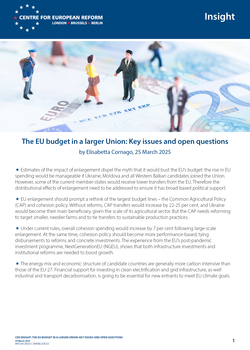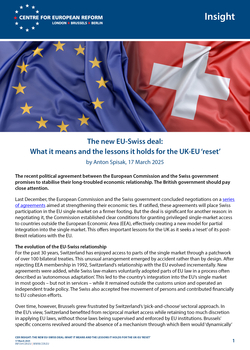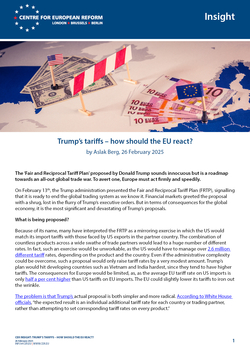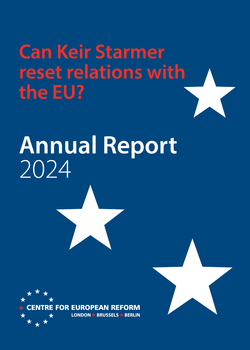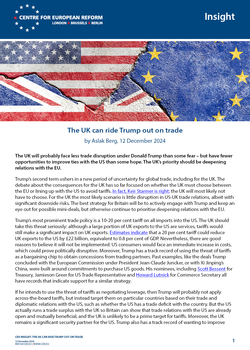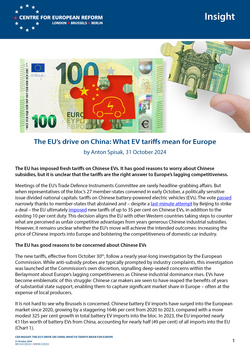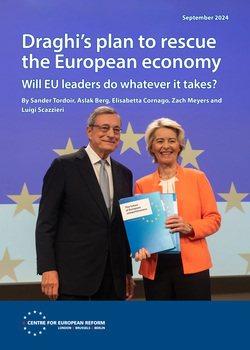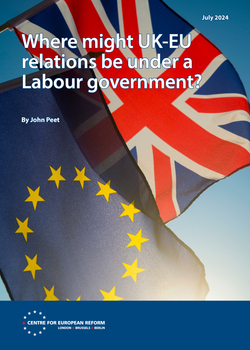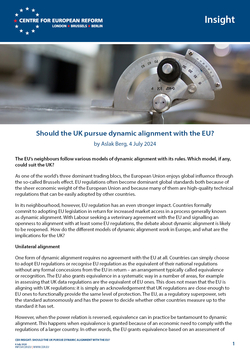Single market, competition & trade
The EU budget in a larger Union: Key issues and open questions
25 March 2025
EU enlargement does not need to bust the EU’s budget. But the distributional effects of enlargement need to be addressed to ensure it has broad-based political support.
The new EU-Swiss deal: What it means and the lessons it holds for the UK-EU 'reset'
17 March 2025
The recent political agreement between the European Commission and the Swiss government promises to stabilise their long-troubled economic relationship. The British government should pay close attention.
Trump's tariffs – how should the EU react?
26 February 2025
The ‘Fair and Reciprocal Tariff Plan’ proposed by Donald Trump sounds innocuous but is a roadmap towards an all-out global trade war. To avert one, Europe must act firmly and speedily.
How to build and fund a better EU green industrial policy
19 February 2025
The EU should revamp its industrial policy for clean technologies not to cede leadership in clean tech manufacturing to China as Trump's America backtracks from decarbonisation goals.
Can Keir Starmer reset relations with the EU?: Annual report 2024
17 February 2025
The CER's annual report starts with an essay on whether Keir Starmer can reset relations with the EU.
Europe and the global economic order
22 January 2025
Geopolitical rivalries threaten the legal order on which European trade depends. To maintain its influence and secure its trade relations, the EU must maintain its openness and build alliances.
How German industry can survive the second China shock
16 January 2025
China's industrial subsidies and aggressive export-led growth are undercutting German manufacturing. To defend its automotive and engineering sectors, Germany must finally get tough on China with trade and industrial policies.
The UK can ride Trump out on trade
12 December 2024
The UK will probably face less trade disruption under Donald Trump than some fear – but will have fewer opportunities to improve ties with the US than some hope.
Implementing the AI Act: The Commission's first big test for better regulation
06 December 2024
Ursula von der Leyen has said her next Commission will simplify the EU’s complex regulatory environment to boost growth, especially in high-tech sectors.
French lessons for Britain's economy
01 December 2024
Since 2008, the UK has had weak productivity growth compared to the US and France. But France's high-investment model offers more lessons for a smaller, more open economy like Britain.
Is investing in public health a no-brainer?
21 November 2024
The EU should prioritise public health investment under its new fiscal rules and post-2027 budget to secure the productivity of its shrinking workforce and sustain economic growth.
Can Europe navigate Trump 2?
08 November 2024
Donald Trump will be the next US president. Europe’s leaders need to accept this reality and protect European interests.
The EU's drive on China: What EV tariffs mean for Europe
31 October 2024
The EU has imposed fresh tariffs on Chinese EVs. It has good reason to worry about Chinese subsidies, but it is unclear that the tariffs are the right answer to Europe’s lagging competitiveness.
Competition policy must reflect Europe's reality, not its aspirations
23 October 2024
The European Commission is under pressure to tweak competition laws to promote European innovation.
Surviving Trump 2.0: What does the US election mean for Europe's economy?
03 October 2024
While EU leaders fret about a second Trump presidency, they should not be complacent about Kamala Harris’s prospects. Neither president would fundamentally change the economic dilemmas facing Europe.
Draghi's plan to rescue the European economy: Will EU leaders do whatever it takes?
17 September 2024
Mario Draghi offers EU leaders a convincing roadmap out of economic stagnation. But the road to implementation is going to be politically difficult.
In the UK's plans for AI, Brussels still looms large
25 July 2024
The new British government plans to regulate powerful AI models. But it should also influence how European authorities implement their law on AI and help shape global norms on AI regulation.
Where might UK-EU relations be under a Labour government?
18 July 2024
The Labour government offers a chance for a new start for UK-EU relations. But the UK will have to both address the causes of Brexit and present a compelling offer.
Should the UK pursue dynamic alignment with the EU?
04 July 2024
The EU’s neighbours follow various models of dynamic alignment with its rules. Which model, if any, could suit the UK?
Why cities must drive growth in the EU's single market
20 June 2024
By integrating European services markets and investing in cities with high potential, the EU can raise its anemic growth rate and spread economic activity beyond successful metropolises.









